Comprehensive Guide to the Services Used by a Vet Oncologist
Veterinary oncology incorporates a broad selection of services focused on identifying and treating cancer cells in animals. Board Certified Veterinary Oncologist. Oncologists use sophisticated analysis techniques and use various therapy alternatives tailored per animal's requirements. They additionally prioritize encouraging care and supply important sources for animal proprietors. Understanding these services is crucial for making notified choices. What particular elements of vet oncology can notably affect a pet dog's treatment trip?
Understanding Vet Oncology
Vet oncology is a specific area concentrated on detecting and dealing with cancer cells in animals. This self-control incorporates a variety of approaches, from medical treatments such as radiation treatment and immunotherapy to surgical interventions targeted at eliminating lumps. Veterinary oncologists are trained to acknowledge the one-of-a-kind indications of cancer in various types, allowing them to customize therapy strategies to individual clients.
Along with conventional therapies, vet oncology stresses encouraging treatment, which plays an important role in enhancing the quality of life for afflicted animals. This includes pain management, nutritional assistance, and palliative treatment alternatives. Cooperation with pet dog owners is vital, as they are important to decision-making regarding their family pets' treatment courses. As research study developments, veterinary oncology continues to progress, using new hope and improved outcomes for pets detected with cancer cells. Generally, this field is fundamental for addressing the intricacies of cancer cells in buddy animals.
Advanced Diagnostic Techniques
Advanced analysis methods play a vital function in veterinary oncology, giving essential understandings into the presence and level of cancer cells in animals. Imaging modalities such as ultrasound, CT scans, and MRI are commonly used to picture tumors and analyze their features. Furthermore, biopsy procedures are necessary for getting tissue examples, enabling for definitive medical diagnosis and customized treatment strategies.
Imaging Modalities Utilized
Imaging modalities play an essential function in the diagnosis and monitoring of cancer in pets. Veterinary oncologists use various innovative imaging techniques to examine tumor size, existence, and transition. Radiography, or X-rays, uses a preliminary view of bone and upper body conditions, while ultrasound supplies real-time imaging of soft cells, permitting in-depth evaluation of interior body organs. Calculated tomography (CT) enhances visualization of complicated physiological frameworks and enables 3D restorations, assisting in precise growth localization. Magnetic vibration imaging (MRI) is invaluable for soft tissue distinction, specifically in mind tumors. In addition, nuclear medication strategies such as positron exhaust tomography (PET DOG) assistance recognize metabolic activity within lumps. Collectively, these modalities improve analysis precision, guiding effective treatment methods for oncological people.
Biopsy Treatments Explained
Following the initial evaluation with imaging techniques, acquiring a conclusive medical diagnosis usually requires cells tasting via biopsy treatments. Vet oncologists make use of numerous biopsy strategies based upon the lump's area and attributes. Great needle ambition (FNA) is a minimally intrusive technique that draws out cells for cytological evaluation, suitable for superficial masses. Core needle biopsies provide larger cells examples and are beneficial for much deeper growths, enabling for histopathological analysis. Surgical biopsies involve excising a section or the whole growth, assisting in extensive assessment. These procedures not just validate the existence of cancer but additionally aid identify its type and quality, assisting treatment decisions. Each biopsy strategy is chosen thoroughly to balance analysis precision with client safety and convenience.
Treatment Alternatives for Cancer in Pets
When a family pet is diagnosed with cancer cells, a variety of therapy options appear to assist take care of the illness and boost lifestyle. Vet oncologists usually advise a multidisciplinary method customized to the individual animal's requirements, which may include surgery, radiation treatment, immunotherapy, or alternative therapies.
Surgery is typically used to get rid of tumors and affected tissues, possibly leading to complete remission in many cases. Radiation treatment aims to damage and target cancer cells, reducing growth dimension and alleviating signs - Board Certified Veterinary Oncologist. Immunotherapy takes advantage of the pet dog's immune system to combat cancer cells extra properly, while alternative therapies might include acupuncture or natural supplements to support general health and wellness
Each treatment option carries its own benefits and risks, and veterinary oncologists work carefully with animal owners to create a thorough strategy that straightens with the pet's specific diagnosis and the proprietor's dreams. The best objective is to boost the family pet's convenience and high quality of life throughout their cancer journey.
Chemotherapy for Animals
Radiation treatment is an usual therapy choice for family pets identified with cancer and is typically utilized along with other treatments laid out by vet oncologists. This treatment involves the administration of specific medicines created to target and ruin cancer cells, thereby reducing lump dimension and stopping the spread of the illness. Veterinary oncologists customize chemotherapy protocols based upon the kind of cancer, the pet dog's total health and wellness, and the desired therapy result.
Negative effects can occur, as these medications may additionally impact healthy cells. Usual reactions consist of queasiness, vomiting, and temporary adjustments in appetite - Veterinary Oncology Services. Veterinary oncologists are outfitted to manage these negative effects successfully, ensuring the family pet's convenience throughout the treatment procedure. Routine surveillance with blood examinations and follow-up appointments is vital to examine the pet's action to chemotherapy and make needed changes. Eventually, radiation treatment can provide considerable benefits, improving the lifestyle for pets dealing with cancer cells diagnoses

Radiation Treatment in Veterinary Medication
Radiation treatment acts as a reliable therapy option for pet dogs identified with localized lumps, using a targeted approach to cancer cells administration. This strategy uses high-energy radiation to damage the DNA of cancer cells, hindering their capability to multiply. It is especially beneficial for growths that are not amenable to medical removal or for situations where surgery might not be feasible as a result of the tumor's place.
Vet oncologists tailor radiation methods based the original source on lump place, kind, and size, in addition to the family pet's overall health and wellness. Therapy can be delivered by means of external beam radiation or brachytherapy, each with unique benefits. Generally, several sessions are called for to take full advantage of performance while minimizing side impacts.
Animals may experience momentary responses such as skin irritability, the overall aim is to shrink tumors Go Here and ease signs and symptoms, inevitably improving the pet dog's prognosis and top quality of life. As necessary, radiation treatment plays an essential role in extensive cancer cells treatment.
Palliative Treatment and Quality of Life
Palliative treatment in veterinary oncology concentrates on improving the quality of life for family pets dealing with incurable health problems, guaranteeing convenience and dignity in their last days. This specialized technique focuses on discomfort monitoring, sign control, and emotional assistance. Vet oncologists evaluate each animal's private requirements, customizing treatments to relieve pain and boost total well-being.
Techniques may include providing drugs for pain relief, handling nausea or vomiting, and resolving various other upsetting signs. Additionally, nutritional support is often given to keep toughness and boost appetite. The emotional aspect of palliative care is similarly crucial; producing a tranquil atmosphere assists reduce anxiety for both pet dog and proprietor.
Ultimately, the objective of palliative care is to enable family pets to enjoy their continuing to be time with as much happiness and dignity as possible. By concentrating on convenience and quality of life, vet oncologists play a crucial function in guaranteeing that pets and their family members browse this challenging trip with empathy and understanding.
Support for Pet Dog Owners During Treatment

Psychological Advice for Proprietors
Charting the emotional landscape during a pet dog's cancer cells therapy can be a frustrating experience for owners. The uncertainty surrounding medical diagnosis and prognosis can lead to sensations of despair, helplessness, and stress and anxiety. Veterinary oncologists identify the value of emotional support and usually offer support to help proprietors navigate this challenging trip. Interaction is crucial; talking about treatment choices and potential end results can reduce some worries. In addition, supplying peace of mind that emotional responses are legitimate fosters a helpful environment. Many oncology facilities might also suggest assistance groups or therapy services tailored for family pet owners, helping with common experiences. Motivating proprietors to focus on self-care throughout this time around is crucial, as their psychological well-being straight affects see post their family pet's comfort and overall treatment experience.

Resources and Educational Products
Guiding through the complexities of a pet's cancer treatment can be intimidating for proprietors, making access to reliable resources and educational materials important. Vet oncologists usually offer a range of handouts, sales brochures, and online products that discuss treatment choices, potential adverse effects, and care techniques. These resources help empower and debunk the process animal proprietors to make informed choices. Furthermore, lots of oncology clinics use accessibility to sustain teams and online forums where proprietors can get in touch with others facing similar obstacles, fostering a sense of community. Educational seminars and webinars performed by veterinary specialists additionally boost understanding, guaranteeing that owners are well-equipped to navigate their pet's journey via cancer cells therapy with confidence and expertise.
Regularly Asked Inquiries
Exactly How Can I Prepare My Animal for a Veterinary Oncology Browse Through?
Preparing a pet for a vet oncology check out includes gathering medical records, keeping in mind signs, and ensuring the family pet is comfy. A calm disposition and familiar products can help reduce anxiety during the appointment.
What Are the Indications My Pet May Have Cancer Cells?
Indications that a pet may have cancer cells consist of unexplained weight loss, persistent vomiting or diarrhea, unusual swellings or swellings, lethargy, adjustments in hunger, problem breathing, and modifications in actions. Trigger vet focus is vital.
Just How Can I Assistance My Family Pet Emotionally Throughout Treatment?
Supporting an animal mentally during therapy includes giving convenience, keeping routines, providing gentle love, and making sure a calm environment. Involving in quiet play and regular companionship assists minimize stress and promotes a complacency.
Are There Alternate Treatments for Family Pets With Cancer cells?
Alternative therapies for family pets with cancer consist of acupuncture, natural therapies, and nutritional assistance. These methods may enhance conventional therapies, promoting overall wellness. Consulting with a veterinarian is crucial for safe and reliable combination of alternative therapies.
What Prices Should I Expect for Vet Oncology Providers?
The awaited expenses for veterinary oncology services can differ substantially, commonly affected by diagnostics, therapies, and recurring care. Animal owners must get ready for costs varying from consultations to specialized therapies, mirroring the complexity of cancer cells monitoring.
Cooperation with family pet proprietors is vital, as they are indispensable to decision-making concerning their pet dogs' therapy paths. Each therapy choice brings its own advantages and risks, and vet oncologists function very closely with family pet owners to create a detailed strategy that aligns with the family pet's particular diagnosis and the proprietor's dreams. Family pets might experience short-term reactions such as skin inflammation, the general objective is to shrink growths and relieve symptoms, inevitably boosting the pet dog's prognosis and high quality of life. Support for pet owners throughout therapy is crucial in steering through the emotional obstacles connected with a family pet's cancer cells medical diagnosis. Preparing an animal for a veterinary oncology check out involves gathering clinical documents, keeping in mind symptoms, and guaranteeing the animal is comfy.